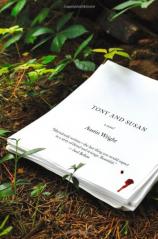Tony and Susan
Review
Tony and Susan
Susan Morrow's present life is comfortable but not perfect. Her surgeon husband, Arnold, was once quite frank with her about his take on monogamy, but when she asked him to change his philosophy to be more in line with her pro-monogamy stance, he glibly agreed. However, it's been apparent during their 25-year marriage that he’s never changed his ways. This doesn't make Susan happy, but she's managed to live with it, concentrating on their three children, their home, and her part-time job teaching English at the local community college. She believes she’s content enough.
"...[A] marvelous Russian-nesting-doll blend of fine literature and suspenseful thriller."
Then Susan's ex-husband writes to her. When she was married to Edward, he believed he was a writer, quitting his job to try (unsuccessfully) to pen something publishable while allowing Susan to support him. During their marriage, Edward asked Susan to critique his writings; that turned out to be an uncomfortable mistake. Now, unaccountably, he's asking her to read a novel manuscript he's written. Although she hasn't heard from Edward in 20 years, other than rote Christmas cards mailed by his present wife, Susan finally decides she will read his manuscript. She feels imposed upon by the request, yet she's afraid he'll believe a refusal means she's still dwelling in their past.
Edward's package arrives. Susan sees that he has titled his manuscript Nocturnal Animals. Three months pass, and she hasn't read it. During that time, she cleans, teaches, cooks, parents and pays bills while an intangible worry nags at her. While she anticipates reading Edward's novel, she also procrastinates beginning it. She can't help but feel a niggling concern that he might want to rekindle their long-gone romance. Finally she receives a Christmas card from Edward's wife telling her that Edward will be in Chicago on December 30th and would like to see her. Susan is sure he will want to discuss his manuscript. With Arnold leaving for a three-day conference right after Christmas, she can use that time to read Edward's book. As she waits, she remembers skinny, birdlike Edward. She wonders what he'll look like when they meet and hopes his novel is not clumsily written. She feels that she is embarking on a risky voyage. What if he includes symbols known intimately to her because of their long-ago marriage? Or would it be worse to be bored or depressed by his writing?
On the Monday after Christmas, with Arnold gone, she finally sits down to read. In the back of her mind is that elusive feeling of concern. For one thing, she knows Arnold will be interviewing for a new position. If the interview is successful, it will mean a move. She also has other vague worries about Arnold's trip, but she puts them out of her mind as she begins to read Nocturnal Animals, which begins with a car trip by a man named Tony Hastings. Tony, his wife Laura, and daughter Helen are driving to their summer cottage in Maine. Helen challenges her father by suggesting they drive all night instead of stopping in a motel, and he surprises her (and himself) by agreeing. At first, Tony enjoys driving through the night, but eventually he runs into the worst nightmare imaginable --- a situation so terrible as to cause a gut-twisting visceral reaction in anyone who learns of it within Nocturnal Animals, within TONY AND SUSAN, and within readers of both stories.
Ominous foreboding builds in Susan as she reads Edward's manuscript and in the reader (yet none of us can avoid obsessively turning the pages). Nocturnal Animals hooks deep into Susan, releasing layers of her past while leading her toward some inescapable future. She can't help pondering the awful vulnerability and uncertainty of humans. The same can be said about those of us reading this marvelous Russian-nesting-doll blend of fine literature and suspenseful thriller.
Reviewed by Terry Miller Shannon on September 8, 2011




